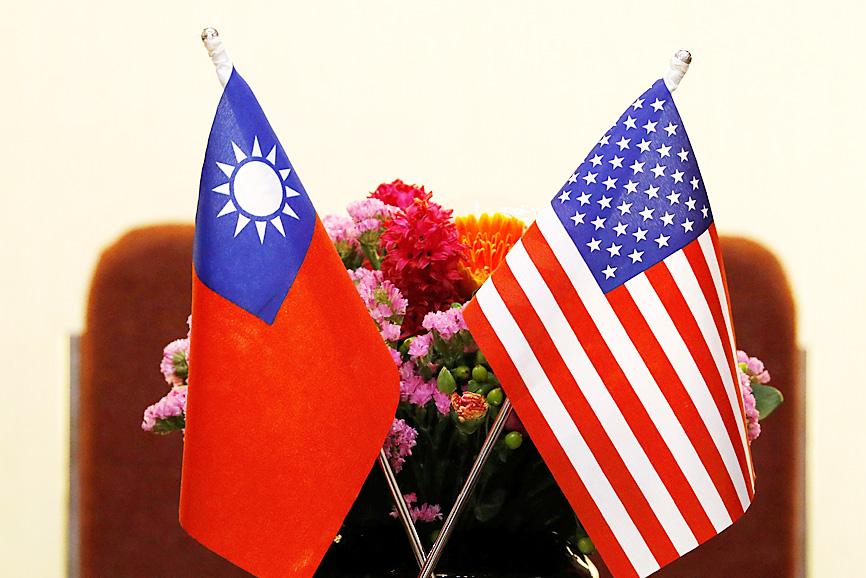The US would seek to ensure that its competition with China does not escalate into conflict and affect stability in Taiwan as the US and Chinese presidents meet virtually today, Representative to the US Hsiao Bi-khim (蕭美琴) said on Saturday.
The White House said that US President Joe Biden and Chinese President Xi Jinping (習近平) would discuss ways to “responsibly manage the competition” between the two countries and how to work together where their interests align.
The Wall Street Journal reported that Taiwan could be one of the topics covered.

Photo: Reuters
Hsiao said that Taiwan has trust in the US and there is close communication between the two sides.
Taiwan’s understanding is that the meeting is about managing competition, she said, adding that as there are multiple layers of competition between the US and China, the US would aim to ensure that it does not escalate into conflict, and affect peace and stability in Taiwan.
The safety and security of Taiwan is an important and critical issue to the US and to other stakeholders in the region, she added.
In Taipei, Ministry of Foreign Affairs deputy spokesman Tsuei Ching-lin (崔靜麟) yesterday said that since Biden took office, his administration had on numerous occasions reiterated that its support for Taiwan was “rock solid,” which it has also demonstrated through numerous actions.
Tsuei thanked Washington for its support, and said that Taiwan would continue to strengthen its defensive capabilities to safeguard its freedoms and democracy.
It would also continue to cooperate with the US and other countries to promote peace in the Asia-Pacific region, he said.
In other news, Hsiao was on Saturday asked whether a referendum next month aimed at overturning a decision by the government to allow the importation of pork containing traces of the feed additive ractopamine would affect Taiwan-US relations if it passes.
She said that whether Taiwan’s trade policy was consistent with international standards and based on scientific evidence was an issue that “the US has been concerned about for many years.”
Additional reporting by Lu Yi-hsuan

AGING: As of last month, people aged 65 or older accounted for 20.06 percent of the total population and the number of couples who got married fell by 18,685 from 2024 Taiwan has surpassed South Korea as the country least willing to have children, with an annual crude birthrate of 4.62 per 1,000 people, Ministry of the Interior data showed yesterday. The nation was previously ranked the second-lowest country in terms of total fertility rate, or the average number of children a woman has in her lifetime. However, South Korea’s fertility rate began to recover from 2023, with total fertility rate rising from 0.72 and estimated to reach 0.82 to 0.85 by last year, and the crude birthrate projected at 6.7 per 1,000 people. Japan’s crude birthrate was projected to fall below six,

Conflict with Taiwan could leave China with “massive economic disruption, catastrophic military losses, significant social unrest, and devastating sanctions,” a US think tank said in a report released on Monday. The German Marshall Fund released a report titled If China Attacks Taiwan: The Consequences for China of “Minor Conflict” and “Major War” Scenarios. The report details the “massive” economic, military, social and international costs to China in the event of a minor conflict or major war with Taiwan, estimating that the Chinese People’s Liberation Army (PLA) could sustain losses of more than half of its active-duty ground forces, including 100,000 troops. Understanding Chinese

US President Donald Trump in an interview with the New York Times published on Thursday said that “it’s up to” Chinese President Xi Jinping (習近平) what China does on Taiwan, but that he would be “very unhappy” with a change in the “status quo.” “He [Xi] considers it to be a part of China, and that’s up to him what he’s going to be doing, but I’ve expressed to him that I would be very unhappy if he did that, and I don’t think he’ll do that. I hope he doesn’t do that,” Trump said. Trump made the comments in the context

SELF-DEFENSE: Tokyo has accelerated its spending goal and its defense minister said the nation needs to discuss whether it should develop nuclear-powered submarines China is ramping up objections to what it sees as Japan’s desire to acquire nuclear weapons, despite Tokyo’s longstanding renunciation of such arms, deepening another fissure in the two neighbors’ increasingly tense ties. In what appears to be a concerted effort, China’s foreign and defense ministries issued statements on Thursday condemning alleged remilitarism efforts by Tokyo. The remarks came as two of the country’s top think tanks jointly issued a 29-page report framing actions by “right-wing forces” in Japan as posing a “serious threat” to world peace. While that report did not define “right-wing forces,” the Chinese Ministry of Foreign Affairs was